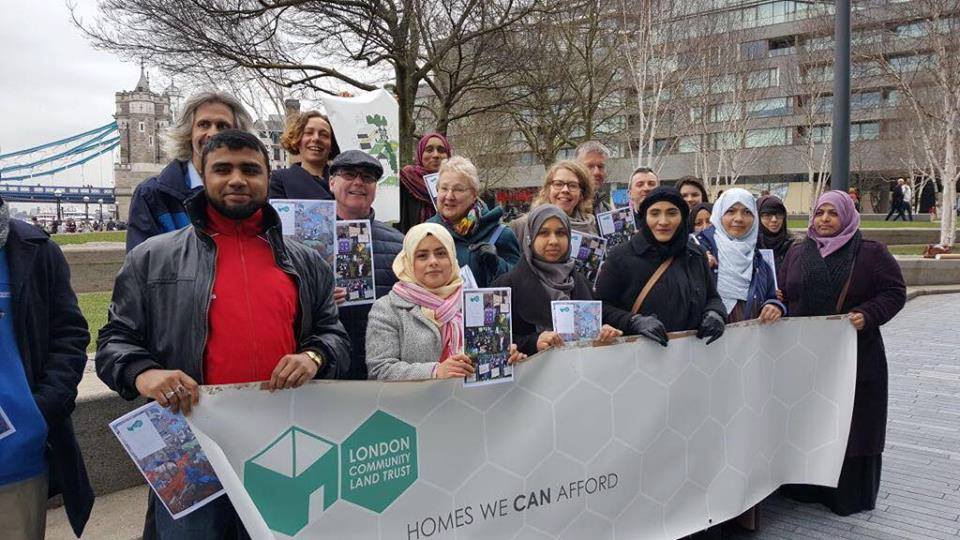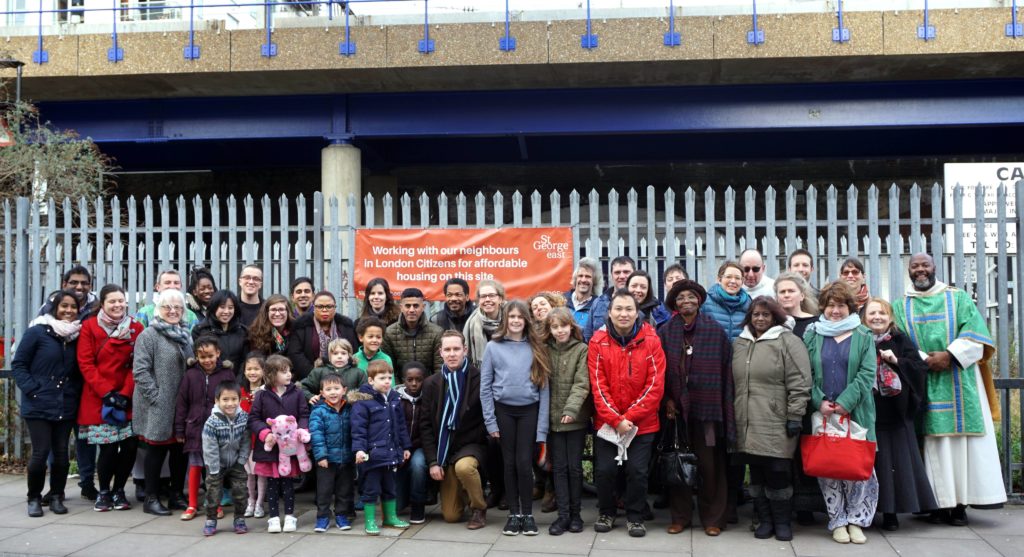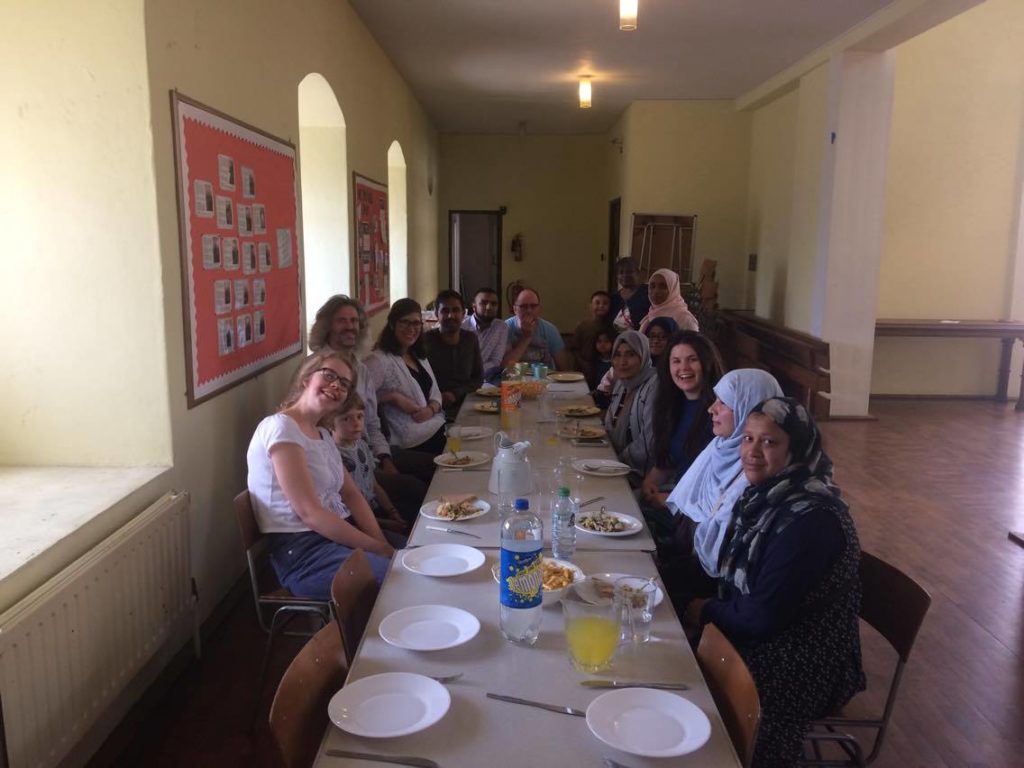
Transformational politics for the Common Good
Should churches be looking to tackle not only financial poverty, but also cultural and political poverty in their own neighbourhoods? Enabling leadership within local communities brings tangible results – it can be transformational for all involved, and builds a more generous kind of politics. Miriam Brittenden took part in the Buxton Leadership Scheme in 2017-18, working locally in East London on a church-supported community organising housing initiative and in Parliament for the Bishop of Durham. Her unique account shows that the conditions for building the Common Good are strengthened when both local communities and our national political life are infused with a more human and relational culture.
Three months ago, I was sat around a table in my church, sharing a meal with neighbours. It was not just any meal, but a celebration. Somehow, with much prayer and exhaustive campaigning between us and many more who were not present, we had managed to win forty affordable homes for our community on a patch of scrubland opposite the church.
As I looked around the room, I was struck by the diversity around me – individuals of all ages, from babies to the elderly, different ethnicities, Muslims, Christians, rich, middle class, poor. As members of the group shared their highlights from being involved in the campaign, I realised that the joy many of us were feeling was not simply because of the (astonishing) feat we had achieved in securing the land and homes which were to be built. The joy was palpable because of the community of people which had been nurtured along the way. As one woman put it ‘I’d never have met most of the people in this room if it wasn’t for this campaign’.
My biggest “take home” from the Buxton Leadership programme is that we are spiritual beings as much as we are physical, each of us yearning for identity, belonging and community. This is something which I think both the left and right are equally guilty of forgetting. Through both of the placements that I completed this year I have witnessed first-hand just what a shame this is. The nurturing of social bonds amongst politically empowered, engaged and authentically diverse but fundamentally united local communities is just as valuable as the issue they are attempting to challenge, whether it be housing or knife crime.
One of the greatest joys of being the community organiser on the Shadwell Affordable Housing Campaign was witnessing the flourishing in confidence of individuals who may never have perceived themselves as leaders in their community, or as having the power to affect change. I got to know some remarkable local Bangladeshi women throughout the year, one of whom, Maryam, a mother of four teenagers, was fairly shy about speaking in front of the group when she came along to her first meeting. Just a few months later, when we handed in our community land trust bid at City Hall (see the photo above), she delivered one of the most eloquent and completely unplanned speeches I’ve ever heard, richly and authentically capturing the meaning of the moment for the small crowd of us gathered there.
Too often our political discourse defaults to a transactional approach over a transformative one, taking a reductive view of people as passive recipients or market consumers. Community organisers can also fall prey to transactional instincts, turning local people into instruments for centralised campaign goals. But when practised through a Christian lens, I have seen that community organising can be genuinely transformational, seeing people as inherently precious, made in the image of God, and as agents who can act for their own and each others’ good and fulfilment.

Bobby Kennedy said in a speech in 1968 that ‘even if we act to erase material poverty, there is another great task; it is to confront the poverty of satisfaction, purpose and dignity that afflicts us all’. Those words couldn’t be truer half a century later – you only have to look at the raw political divisions which exist across not only the UK but also across much of the Western world. There is a deep hunger for meaning and some kind of shared vision which offers more than the meeting of material needs.
Policymakers in Westminster could learn from this too. I had the privilege of supporting a campaign, led by the Bishop of Durham, to reverse the UK Government’s decision to limit child tax credits to only two children per family under Universal Credit. This policy is driven by a transactional, economic goal to reduce costs and move as many people into work as possible. However, by default, it characterises the decision to have children as purely economic and rational. I believe this undermines the vital cultural role of motherhood and the family, and one of its consequences is to make the choice to stay at home with children an economic one. The effect of this policy is likely to restrict that choice only to those who can afford it, and it is projected to push many more children, who are surely of infinite value in and of themselves, into poverty.
When seeking to push back against this policy, I learnt that a campaigning approach that frames the opposition as the enemy is often ineffective. Change won’t happen without working with people with whom we may disagree. A politics of the Common Good does not demonise the other, nor is it a zero sum game. As Adrian Pabst has put it
“equality is not about making everyone the same, but rather creating equal access to the good life in common’, and in order to create equality of opportunity to access that good life, we need to try and understand those who think differently from us.” [Extract from Blue Labour: Forging a New Politics (2015, Eds Geary and Pabst)]

Whilst campaigning to tackle London’s housing crisis, it would be all too easy for us as church-based community organisers to malign greedy developers or an ineffective, bureaucratic government, or a local council that is failing to meet housing demand. But in our community land trust campaign, if we hadn’t been willing to work with such parties, our efforts would ultimately have failed. Delivering community-owned and community-run housing requires reaching out to others and working with local bodies and partners, which is part and parcel of what it means to be Christian.
Indeed, the principle of subsidiarity asks each of us, both as individuals and as institutions, to take on our appropriate level of responsibility, and to help each other: this calls us to cooperation and collaboration across different parts of society.
Similarly, in the two-child limit campaign, in my role as Parliamentary Assistant, I soon learned that in order to be effective we needed to build relationships with decision makers of different stripes. The reality is that policies won’t shift without conversation with all sides, Conservatives AND Labour, and other parties from across the UK. For each meeting the bishop had with an MP, it was important to understand where that individual was likely to be coming from, to put ourselves in their shoes and to see their perspective, framing arguments accordingly, ultimately to find our common interest (these are some of the nuts and bolts of the community organising approach). Though there is still a long way to go with that campaign, we now have a significant cross-party coalition of MPs committed to working with us on this important issue.
There is much hollow talk about ‘a kinder, nicer politics’ but rarely does it sound genuine. Tribalism and ideological positions are increasingly the default, driving people apart. Our country desperately needs a warmer politics, a politics of the Common Good in which the goal is not flourishing for the minority, or even for the majority, but flourishing for all. Shouting or putting up walls, from either side of the fence, gets us nowhere. Building relationships across those divides does.
Tribalists might regard this as tantamount to ‘selling out’, but they are wrong. Forging relationships across divides is to accept and honour the reality that we live in a world in which we are not all on the same page, and intelligent people do come to different conclusions. Fighting has harmful consequences, but taking each other seriously in good disagreement and deliberation is how we make sense of the world.
The reality is we are all human beings, children of the living God, with hopes, fears, aspirations and stories to tell. When we stop, listen and work with ‘the other’, whether that be a Conservative MP or a young mother living in overcrowded social housing, and we trust that God is at work, not only do we escape our echo chambers but we also learn and grow as people. We begin to discover that another world is possible.
Miriam Brittenden
Since writing this story, Miriam Brittenden has become the Co-ordinator of the Buxton Leadership Programme at the Centre for Theology and Community. She also leads T4CG’s New Perspectives Network in a voluntary capacity in her spare time.
